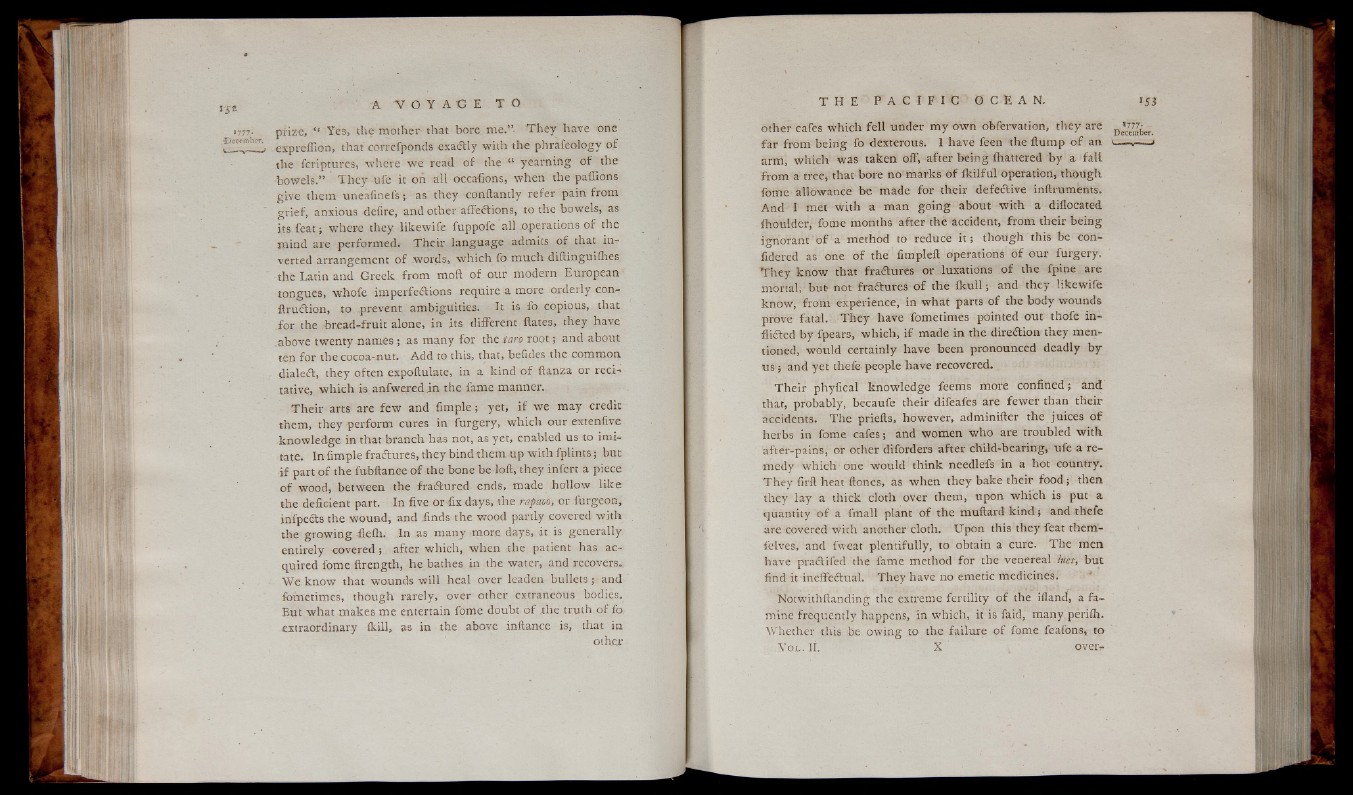
1777. prize, “ Yes, the mother that bore me.” T h e y have one
December.^ that coi'refponcls exadtly with the phrafeology o f
the fcriptures, where w e reajl o f the “ yearning o f the
bowels.” T h e y ufe it on a ll occasions, when the paffions
giv e them uneafinefs; as they conftantly refer pain from
g r ie f, anxious defire, and other aii'ections, to the bowels, as
its fe a t ; where they likewife fuppofe all operations o f the
mind are performed. T h e ir langu ag e admits o f that inverted
arrangement o f words, w h ich fo much diftinguifhes
the Latin and G re ek from moft o f our modern European
tongues, whofe imperfections require a more orderly con-
ftrudlion, to prevent ambiguities. It is fo copious, that
fo r the bread-fruit alone, in its different ftates, they have
above twenty n am e s ; as many for the taro ro o t ; and about
ten for the cocoa-nut. Add to this, that, befides the common
dialecft, they often expoflulate, in a kind o f ftanza or recitative,
w h ich is anfwered in the fame manner.
T h e ir arts are few and fimple ; yet, i f we ma y credit
them, they perform cures in furgery, which our extenfive
kn owledge in that branch has not, as yet, enabled us to imitate.
In fimple fra ffu re s, they b ind them up with fplints; but
i f part o f the fubitanc-e o f the bone be loft, they infert a piece
o f wood, between the fraCtured ends, made hollow lik e
the deficient part. In five o r fix days, the rapaoo, or furgeon,
infpedts the wound, and finds the wood partly covered with
the g rowin g fle ih . In a s many m o re days, it is generally
entirely -covered.; after which, when th e patient has acquired
fome ftrength, he bathes in the water, and recovers.;
. We kn ow that wounds w ill heal over leaden bullets ; and
fometimes, though rarely, over other extraneous bodies.
But what makes me entertain fome doubt o f ,the truth o f fo.
extraordinary ikill, as in the above inftance is, that in
other
other cafes which fe ll under m y own obfervation, they are
fa r from being fo dexterous. 1 have feen the ftump o f an »— ■,---
arm, w h ich was taken off, after being ihattered b y a fa ll
from a tree, that-bore no marks o f fld lfu l operation, though
fome allowance be made for their defective inftruments.
And I met with a man g o in g about w ith a diflocated
ihoulder, fome months after the accident, from their being
ignorant o f a method to reduce it ; though this be con-
fidered as one o f the fimpleft operations o f our furgery.
T h e y kn ow that fraitures or luxations o f the fpine are
mortal, b u t not fradfures o f the ik u l l ; and they likewife
know, from experience, in w hat parts o f the body wounds
prove fatal. T h e y have fometimes pointed out thofe in-
fiidted by fpears, w hich, i f made in the direction they mentioned,
wou ld certainly have been pronounced deadly by
u s ; and yet thefe- people have recovered.
T h e ir phyfical kn owledge feems more confined; and
that, probably, becaufe their difeafes are few e r than their
accidents. T he priefts, however, adminifter the juices o f
herbs in fome cafes; and women who are troubled with
after-pains, or other diforders a fter child-bearing, ufe a remedy
which one would think needlefs in a hot country.
T h e y firft heat ftones, as when they bake their fo o d ; then
they la y a thick cloth over them, upon w h ich is put a
quantity o f a fmall plant o f the muftard k in d ; and thefe
are covered with another cloth. Upon this they feat them-
felves, and fweat plentifully, to obtain a cure. T he men
have pradlifed the fame method for the venereal lues, but
find it ineffeftual. They have no emetic medicines.
Notwithftanding the extreme fertility o f the ifland, a famine
frequently happens, in which, it is faid, many periflr.
Whether this be owing to the failure o f fome feafons, to
y o u . ff. X over,-